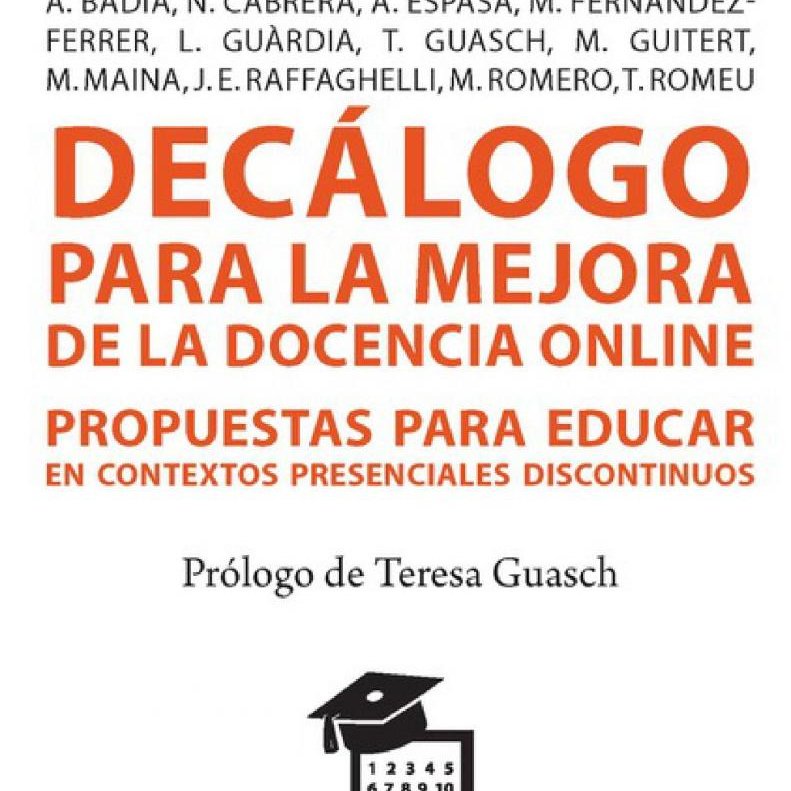The Decalogue for improving online teaching was the institutional repository's most viewed content in 2020
Subject: Multidisciplinary
The book was published in September and in just a few months, it has risen to the top positions in the list of the most downloaded documents from the UOC's institutional repository, O2.
In Decalogue for improving online teaching. Proposals for educating in discontinuous face-to-face contexts (in Spanish), twelve UOC experts in e-learning shared their knowledge for addressing the challenges of educating in the context of a pandemic. In September, the book published by the University was made available to everyone, free of charge, through the institutional repository, O2. Since then, it has become one of the most downloaded documents in 2020 and has received about 10,000 visits.

Albert Sangrà, full professor at the Faculty of Psychology and Education Sciences and the book's coordinator, explained that the decalogue was published in open access as part of the UOC's initiative to partner with the education community. "If we have helped a few teachers, and their students, even if just a little, then we will consider it an effort well made: this is the social impact that our educational research pursues".
In an unprecedented emergency like the present, many teachers wondered how they could continue their classes and avoid disrupting the learning process of thousands of students. The decalogue's authors wanted to "share their knowledge and experience, gained from 25 years of teaching and research," added Sangrà.
The most downloaded contents from the O2 Repository
The second most downloaded content during last year is also related with distance teaching. It is an infographic (in Spanish) prepared by the UOC's eLearn Center on different teaching methodologies, ranging from collaborative work to case studies or narration using digital tools.
The university community's final projects also head the list of repository downloads in 2020. These were the projects:
- Nutrición y salud en la dieta vegana, by María Josefa Andreu Ivorra, who studied for the University Master's Degree in Nutrition and Health (in Spanish).
- Impacto sobre la salud de las emisiones electromagnéticas: radares y tecnología 5G, by Miguel Ángel Romero Fernández-Bravo, who studied for the Joint University Master's Degree in Telecommunications Engineering (UOC, URL) (in Spanish).
- Ayuno intermitente: revisión bibliográfica sobre su efecto en la salud cardiometabólica y en la pérdida de peso, by Patricia del Pilar Martínez Pina, who also studied for the University Master's Degree in Nutrition and Health (in Spanish).
Supporting open access learning
The crisis caused by COVID-19 has driven reflection on the possibilities of e-learning and open sharing of educational resources and practices. To mark the closure of the International Open Education Week (1-5 March), we propose a range of open-access contents that are specific for online education:
- More than 1,600 UOC learning resources, in open access, classified by faculty.
- A collection of 80 books published in open access by Editorial UOC that were made available in the institutional repository during lockdown and have received 7,800 visits so far. Some of the titles include the introductory manual Public relations (in Catalan) and the book about evolutionary psychology, Adolescence (in Catalan).
- The portal Conectad@s: The University at Home, supported by the Ministry of Universities, coordinated by the CRUE and designed by the UNED and the UOC. It contains useful open access content for online education: teaching modules, methodological guidance content, technology platforms and software, and psychological advice.
- A Library guide with the tools and literature references in open access that the UOC's experts shared during the various sessions of the cycle "Emergency remote teaching".
- A selection of specialized resources about recognition of professional experience and open education both in Spain and abroad, created by the Spanish Academic Libraries Network, REBIUN.
All this content is freely available. The aim is to facilitate knowledge exchange with the university community and with society in general, and contribute to accelerating the pace toward sustainable development.

